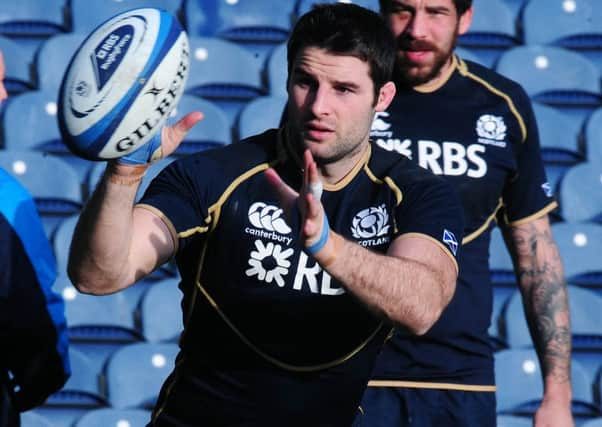Allan Massie: Resolve over foreign-based stars


Here, the SRU have, perforce, been quite relaxed about the departure of players from Edinburgh and Glasgow and, like Williams, assert that they improve by moving to England or France. It is understandable that they are relaxed. The SRU can’t match the salaries available in France and, perhaps, even in England where clubs have to respect a salary cap. Moreover, if we tried to keep players here in Scotland by, for example, adopting a policy, like England’s, of selecting only home-based players for the international team, there would soon, with only two pro clubs, be a log-jam, with younger players kicking their heels in the wings.
Yet, while some players may indeed improve when they move to England or France, this isn’t guaranteed. It’s not so long since the Glasgow back-row of Kelly Brown. Johnnie Beattie and John Barclay – the so-called Killer Bs – looked set to play together for Scotland for years. Then they all moved away and, this season, only Beattie has been in Vern Cotter’s side. Are they better players now than they might have been if they had stayed in Glasgow? Is Richie Gray? One can’t tell. One can only say that improvement is not always evident.
Advertisement
Hide AdAdvertisement
Hide AdIreland and Wales try to keep their players, though of necessity they pick ones like Jonny Sexton and Leigh Halfpenny, who play in France, and George North, who is with Northampton. Yet one may wonder how much of Ireland’s recent success is due to their ability to draw their international squad almost completely from the Irish provinces. Sexton is the only member of their championship-winning team to play his club rugby out of Ireland – and he is apparently returning to Leinster next season.
Australia have just lifted their embargo on foreign-based players, though only to a very limited extent. They are now ready to select such players provided they already have 60 Australian caps. They have done this to enable them to include Matt Giteau and Drew Mitchell in their World Cup squad.
Meanwhile, there is fierce argument in England and pressure on Stuart Lancaster to disregard the agreement with the Premiership clubs which prohibits the selection of foreign (which means French) based players. The Toulon open-side, Steffan Armitage, is at the centre of the controversy, though Clermont-Auvergne’s full-back Nick Abendanon might come into the reckoning too, for he has been in brilliant form. Armitage, however, is reckoned to be the best No 7 in Europe. Few doubt that he would strengthen the side.
However, the agreement between the RFU and the Premiership clubs is there for a purpose – to deter English players from moving to France to earn a higher salary, something which, if it became common, would weaken the Premiership. So the clubs are likely to be very disgruntled, to put it mildly, if Lancaster chooses to breach the terms of the agreement. Some of the players themselves may not be happy. After all, in order to remain eligible for their country, they may have resisted the lures dangled before them by French clubs and it is quite reasonable that they should not be pleased if Armitage, who followed the money, is brought back into the England squad. Two of them, the hooker Tom Youngs and back-row forward Tom Wood, have said that picking Armitage would be bad for team spirit. Perhaps it would, though success usually heals such wounds.
There is a clause in the agreement which permits its breach in “exceptional circumstances”. But what counts as exceptional? If George Ford, Owen Farrell, Danny Cipriani and Stephen Myler, the four leading stand-offs, were all injured, that might be accounted “exceptional” and Lancaster would be allowed to call up Toby Flood, now playing for Toulouse. But is the belief that X playing in France is better than Y playing in England to be judged as an acceptable exceptional circumstance? Surely not, if you put it that way. On the other hand, if the selection of X – that is, Armitage – made the difference between winning the World Cup and failing to do so, what then?
My guess is that Lancaster will stick to the agreement because breaching it might provoke a huge row between the clubs and the RFU. And yet, if England fail in the World Cup because of the perceived inadequacy of their back-row and its failure to win turnovers, then Lancaster will be widely blamed for not picking Armitage. So he’s in a pickle, and it may be that, whatever his decision, only lifting the William Webb Ellis trophy will be thought to justify it.